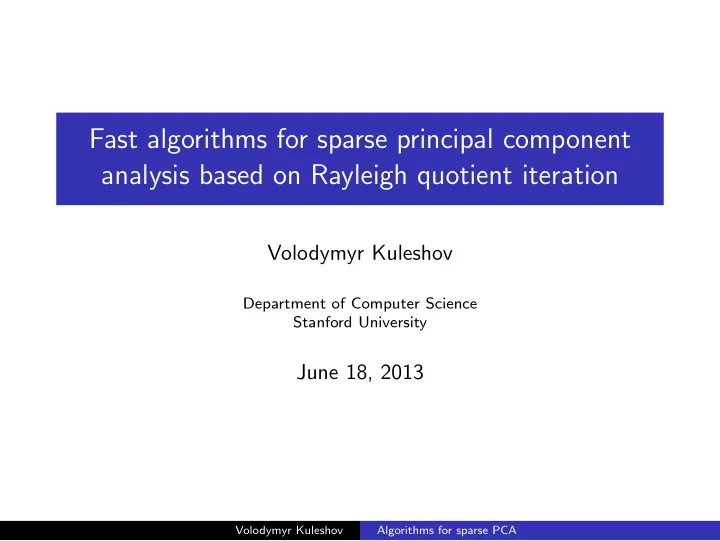

Fast algorithms for sparse principal component analysis based on Rayleigh quotient iteration Volodymyr Kuleshov Department of Computer Science Stanford University June 18, 2013 Volodymyr Kuleshov Algorithms for sparse PCA
Sparse principal component analysis Seeks principal components that maximize variance subject to a sparsity constraint: Sparse PCA PCA max 1 max 1 2 x T Σ x 2 x T Σ x s.t. || x || 2 ≤ 1 s.t. || x || 2 ≤ 1 || x || 0 ≤ k where Σ ∈ R n × n , Σ = Σ T and k > 0. Volodymyr Kuleshov Algorithms for sparse PCA
Current state-of-the-art The most successful methods are variations of the generalized power method . Algorithm 1 GPM(Σ, x 0 , γ , ǫ ) j ← 0 repeat y ← Σ x ( j ) x ( j +1) ← SparsifyAndScale γ ( y ) // New relative to pow. met. j ← j + 1 until || x ( j ) − x ( j − 1) || < ǫ return x ( j ) The sparsification step typically consists of soft thresholding and scaling to a norm of one. Volodymyr Kuleshov Algorithms for sparse PCA
Rayleigh quotient iteration A more sophisticated algorithm for computing eigenvalues than the power method. Algorithm 2 RayleighQuotientIteration(Σ, x 0 , ǫ ) j ← 0 repeat µ ← ( x ( j ) ) T Σ x ( j ) // Rayleigh quotient ( x ( j ) ) T x ( j ) (Σ − µ I ) − 1 x ( j ) x ( j +1) ← || (Σ − µ I ) − 1 x ( j ) || j ← j + 1 until || x ( j ) − x ( j − 1) || < ǫ return x ( j ) Volodymyr Kuleshov Algorithms for sparse PCA
Generalized Rayleigh quotient iteration Algorithm 3 GRQI(Σ, x 0 , k , J , ǫ ) j ← 0 repeat W ← { i | x ( j ) � = 0 } i x ( j ) W ← RQIStep ( x ( j ) W , Σ W ) // Rayleigh quotient update if j < J then x ( j ) ← Σ x ( j ) / || Σ x ( j ) || 2 // Power met. update end if x ( j +1) ← Project k ( x new ) // Project on l 0 ∩ l 2 ball. j ← j + 1 until || x ( j ) − x ( j − 1) || < ǫ return x ( j ) Volodymyr Kuleshov Algorithms for sparse PCA
Comparison Gen. power method Gen. Rayleigh quotient iter. Extends power method Extends Rayleigh quotient iter. Form of gradient descent A second-order method Linear convergence Cubic convergence O ( nk + n 2 ) flops per iter. O ( nk + k 3 ) flops per iter. Converges in about 100 iter. Converges in about 10 iter. Volodymyr Kuleshov Algorithms for sparse PCA
Comparison 7 x 10 12 GPower0 GPower1 10 GRQI 8 Flops 6 4 2 0 0 50 100 150 200 250 Number of non−zero components (a) Flops to compute eigenvector as a function of sparsity ( R 1000 × 1000 ) 4000 GPower0 GPower1 3500 GRQI Variance 3000 2500 2000 1500 0 100 200 300 400 500 600 700 Number of non−zero components (b) Variance/sparsity tradeoff (random matrices in R 1000 × 1000 ) Volodymyr Kuleshov Algorithms for sparse PCA
Summary New algorithms for sparse PCA that Use 10-100x fewer flops than the best current methods; Find sparse components which are as good or better than ones from existing algorithms; Generalize Rayleigh quotient iteration. This motivates further research into second-order methods for doing matrix factorizations. Volodymyr Kuleshov Algorithms for sparse PCA
Recommend
More recommend